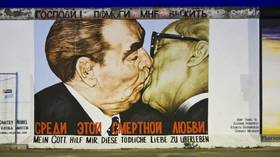Germans go gaga for Russian food discounter Mere amid nostalgia for ‘Iron Curtain’ era

A Russian grocery retailer was nearly forced to close during its grand opening week in Germany when a huge crowd of Leipzig locals arrived and gobbled up almost the entire inventory.
The promising slogan ‘Only Lowest Prices Everyday’ evoked an enormous demand during the first days after the opening that toppled the most optimistic forecasts. The buying fever was reportedly triggered by very attractive prices for foodstuff and basic goods offered by the grocery store that had been opened in early February in a location where an Aldi market once stood.
Also on rt.com Siberian discount chain wins over German consumers challenging local giants Aldi & LidlMere, a food discounter belonging to one of Russia's largest thrift shop chains Torgservis, offers a wide range of goods, from dairy products and coffee to canned food and sausages, manufactured mostly in Eastern European countries.
Shortly after the opening of the store in Leipzig, German media hurriedly accused the Russian business of attacking Aldi and Lidl, Germany’s biggest retail chains with a multi-billion turnover.
According to analysts, Mere will hardly face the problems of the US retail corporation Walmart, which had to withdraw from Germany in 2006 after 10 years of ineffective business.
“Many Germans cannot be identified as rich. There are many citizens living on welfare, pensioners, lonely and older people… In some parts of the country, especially in the East, unemployment rate totals eight percent,” Professor Johannes Ringel from Leipzig’s University told Russia’s state TV channel Rossiya 2.
“In this segment of the market, people usually keep a wary eye on their expenses. That’s why they will go shopping in Mere,” the economist added.
People living in the Eastern parts of Germany are still nostalgic about the German Democratic Republic and like purchasing goods produced in countries of the former Soviet bloc, the media reported. However, most of the customers are rushing to the store because of prices that are nearly 30 percent lower than at other supermarkets.
For more stories on economy & finance visit RT's business section














